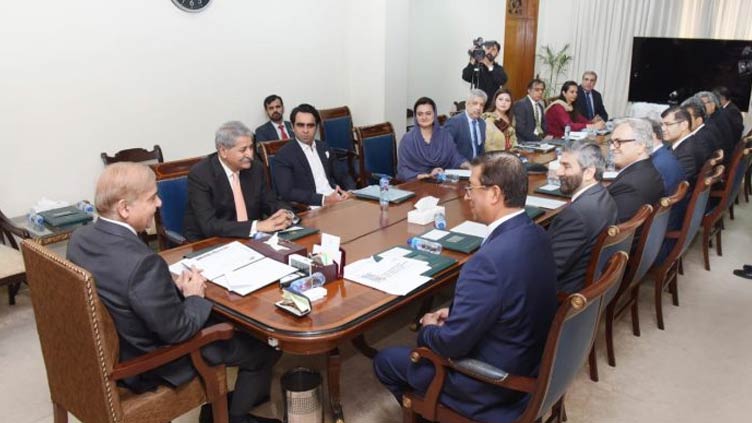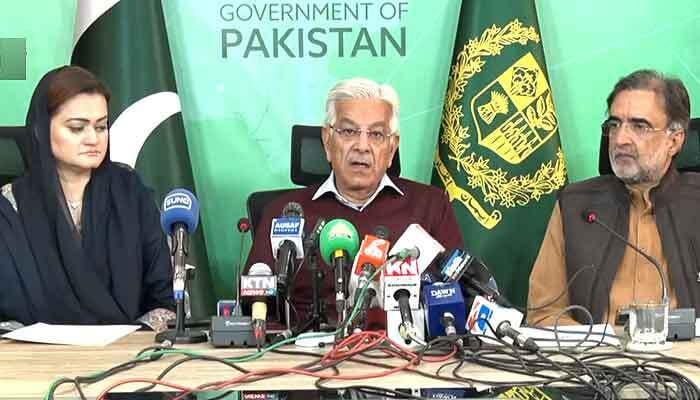
National Economic Council decides to close markets countrywide by 8:00 PM
Ahsan Iqbal ‘energy has become a huge challenge for Pakistan due to global prices’
Says PROJECTS of solar, wind & hydel energy will be promoted & we will not introduce any new project based on imported fuel
ISLAMABAD ( Web News )
The National Economic Council (NEC) on Tuesday decided to close markets countrywide by 8:00 PM.
The decision was taken at a meeting chaired by Prime Minister Mian Muhammad Shehbaz Sharif and attended by the chief minister of Punjab, Sindh and KP, and planning minister of Balochistan.
Federal Minister for Planning, Development and Special Initiatives Ahsan Iqbal Chaudhry said the council had taken the decision to conserve energy, adding that commercial centres would close at 8:00 PM. He also advised use of green energy resources including LED bulbs.
Earlier, the NEC approved the annual development programme, with the total volume standing at Rs2,709 billion for the upcoming budget, sources of a private TV channel said.
It was decided, according to the sources, that the Centre would spend Rs950 billion under the PSDP (Public Sector Development Programme).
On the other hand, the proposed total outlay for the provinces development programme stands at Rs1,559 billion.
Meanwhile, another allocation of Rs250 billion has been approved under public-private partnership for executing development projects across the country.
Under Article 156 of the Constitution, the NEC is headed by the prime minister as its chairman while the provincial chief ministers are among the members. Meanwhile, there are eight nominated persons too – one each from the four provinces and four from the federal side.
The nominations from the federal and provincial sides are made from time to time for reconstituting one of the top constitutional bodies, which regulates the financial affairs among the Centre and the provinces.
The NEC is responsible for reviewing the overall economic condition of the country as well as advising the federal and provincial governments, and formulating plans in respect of financial, commercial, social and economic policies.
Moreover, the Article 156 also reads that “and in formulating such plans it shall, amongst other factors, ensure balanced development and regional equity and shall also be guided by the Principles of Policy set out in Chapter 2 of Part-II” [of the Constitution].
Meanwhile Ahsan Iqbal said on Tuesday that the National Economic Council (NEC) had approved an energy conservation plan under which shops and commercial centres would be closed by 8:00 PM.
The minister announced this during a press conference in Islamabad after an NEC meeting, which was chaired by Prime Minister Shehbaz Sharif and approved the estimated budget figures.
Ahsan Iqbal said issues pertaining to energy and infrastructure were discussed during the meeting, adding that “energy has become a huge challenge for Pakistan due to global prices”.
“Saudi Arabia has cut down oil production by one million barrels, which poses a risk of oil prices rising to $100 per barrel,” he said, highlighting that if the country continued to rely on fossil fuel and oil for its energy needs, “our economy will remain vulnerable”.
To counter this, he said, one of the measures that the government wanted to implement pertained to energy conservation.
Ahsan Iqbal recalled that the federal cabinet had vowed to enforce decisions under a National Energy Conservation Plan in January this year. “But there was no representation of provinces in that meeting. So we took it up again in the NEC, where provincial government representatives were also present.
“And now we hope that provincial governments will ensure the implementation of the energy conservation package that has been approved today.”
The energy conservation plan discussed in the federal cabinet in January proposed closure of markets at 8:30 PM and wedding halls at 10:00 PM, the use of efficient electronic appliances, and a 40 per cent reduction in power consumption in government offices.
It also recommended the imposition of additional duties on inefficient electric fans, use of light-emitting diode LED bulbs, the introduction of electric bikes and phasing out motorcycles that run on petrol and illuminating street lights only at 50 per cent capacity.
Ahsan Iqbal said today that steps for energy conservation recommended under this plan, such as the closure of shops and commercial centres by 8:00 PM, switching to LED lights and upgrading geysers to make them more energy efficient, could help the country save up to $1 billion annually.
Speaking specifically about the early closure of shops, Ahsan Iqbal said even rich nations in Europe and the US could not “afford the luxury of keeping commercial areas open till 10:00 PM or 11:00 PM”. “No [country] has an irresponsible lifestyle as us, keeping shops open till 1:00 AM or 2:00 AM.”
The minister also said that another decision taken regarding the energy sector was to promote green energy.
“Projects of solar, wind and hydel energy will be promoted and we will not introduce any new project based on imported fuel,” he said.
Soon after Ashan Iqbal’s press conference, All Pakistan Anjuman-e-Tajran (APAT), the body representing the trader community of the country, opposed the government’s move. “The government should withdraw the decision to close shops by 8:00 PM,” APAT President Muhammad Ajmal Baloch said in a statement, adding that shops would not be closed at 8pm this summer. He stressed that the energy minister should hold talks with traders on the matter.
Ahsan Iqbal also said the government had approved an estimated 3.5 per cent GDP growth target for the 2023-24 financial year budget.
The government is set to present the annual budget on Friday, at a time when Pakistan faces its worst economic crisis with months of delay in securing funding from the International Monetary Fund (IMF). Ahsan Iqbal said the growth target was realistic. “We’re taking those choices which take the country toward stability,” he said.
The minister did not disclose other budget targets except for the GDP and development spending which he said will be Rs1,150 billion.
Ahsan Iqbal also pointed out the dismal condition of the economy, saying the government would not be able to pay off debt fully through federal revenue. “This is a defining moment of where we’ve reached,” he said. “(The country) will need to borrow for the rest of budget that includes salaries for the government, defense budget, development budget, pension, subsidies.” He also said a committee had been constituted to review the health card scheme.

